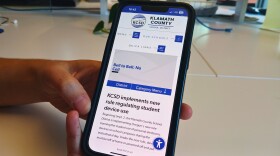This summer, Gov. Tina Kotek issued an executive order mandating all 197 Oregon school districts ban the use of personal electronic devices during the school day. Districts still have a little time to adopt their phone-free policies, but some have already made the switch.
Springfield School District was an early adopter of the new cell phone policy. The district’s Communications Director, Brian Richardson, explained why they decided to implement the ban before the governor’s order takes effect Jan. 1, 2026.
“We didn't want to wait to start this because we thought it was very important to have this ban in effect from the start of the (school) year," he said. "So that way, we weren't having to adjust midstream.”
The kids are alright
To discuss the expectations of the new rule, KLCC joined three students in the commons area at Springfield High School.
Jose Mojarro-Avelar is a junior, Violett Lloyd is a sophomore. and Leesi Brock is a senior.

“I've heard about (cell phone bans) happening in other places around the country and when I heard that it might be getting passed in Oregon, I kind of hoped it would be,” Leesi said. “But I think I was kind of alone in that opinion. Most of my peers were pretty upset about it which is understandable, ‘cuz it's, like, so incorporated into our day.”
Leesi said when cell phones are put away, she feels the classroom is more conducive to learning. And she’s right about this happening elsewhere. As of September, 34 states and the District of Columbia have passed cell phone restrictions or bans in schools, according to a report from Ballotpedia.
11th grader Jose said for him, electronic devices have gotten in the way of group assignments when classmates are on their phones instead of contributing. Still, Jose is torn.
“I like it and hate it because I also like to listen to music, now and then,” he said. “So, the cell phone ban, it has its pros and cons I’ll admit. But as for me: I don't really mind it.”
Exceptions to the rule
There are some exceptions to the new rule, including a medical exemption known as a 504 plan.
“Well, I'm a type one diabetic,” Sophomore Violett explained. “I have a 504 plan and it allows me to use my cell phone to read my blood sugar, to do all the medical things I need to do on it. That's it, only that part.”
Sometimes Violett’s medical exemption can be uncomfortable.
“If you have your phone out during class, everyone looks at you. And they're like, ‘Oh, she's on her phone, they're on their phone.’ Yes, that has happened before. It can be a little nerve-racking to announce to an entire class that you have something going on,” she said.

The electronic devices ban is in effect the entire school day--from “bell to bell.” Phones, tablets and other devices must be “off and away.” That might be in a car, locker or backpack.
In case of emergency
But what about an emergency? Specifically, the terrifying possibility of an active shooter incident…something the district knows all too well.
“I'm trying to think of how to articulate this,” said Leesi. “You know, we do our lock-down drills. And it would honestly be more dangerous if kids had their phones out because like a phone screen lighting up the dark classroom and you're trying to seem like no one is in the room. Or if phones are making noise or someone is filming or talking—then that’s making noise and bringing awareness to where students are.”
Violett said not having her phone during an emergency is concerning.
“If something like that were ever to happen, the first thing that I would want to do is let my parents know that I'm okay,” she said. “Because, I couldn't imagine the thoughts that would race through a parent's mind when something like that is going on.”
Richardson – the district spokesperson – said every school in the district has internal communications tools to reach staff, families and students in the event of an emergency. He added that when electronic devices are out of the picture students tend to engage with each other instead of a gadget. And grades improve.
“Studies have shown that academic results go up-- so we’re excited for that as well,” Richardson said.
Fine tuning policy
One question from the students is how the cell phone ban will be enforced. These students have been carrying phones around with them for much of their young lives and it stands to reason there will be some slip-ups, something that became clear during KLCC's interview with honor student Jose.
“If I don't know what's going on outside or who's texting me or calling me,” Jose said, as he patted his pocket. “I'm getting a call right now, actually.”
Uh-oh!
"I may be in trouble right now,” Jose said, with a chuckle. His fellow students joined in with laughter.
“I have not used my phone at all. I have not used my phone at all!” Jose insisted.
Richardson said the Springfield school board is currently fine-tuning its new cell phone policy. It’s understood there will be mistakes made, here and there: so it won’t hurt to keep a sense of humor.





